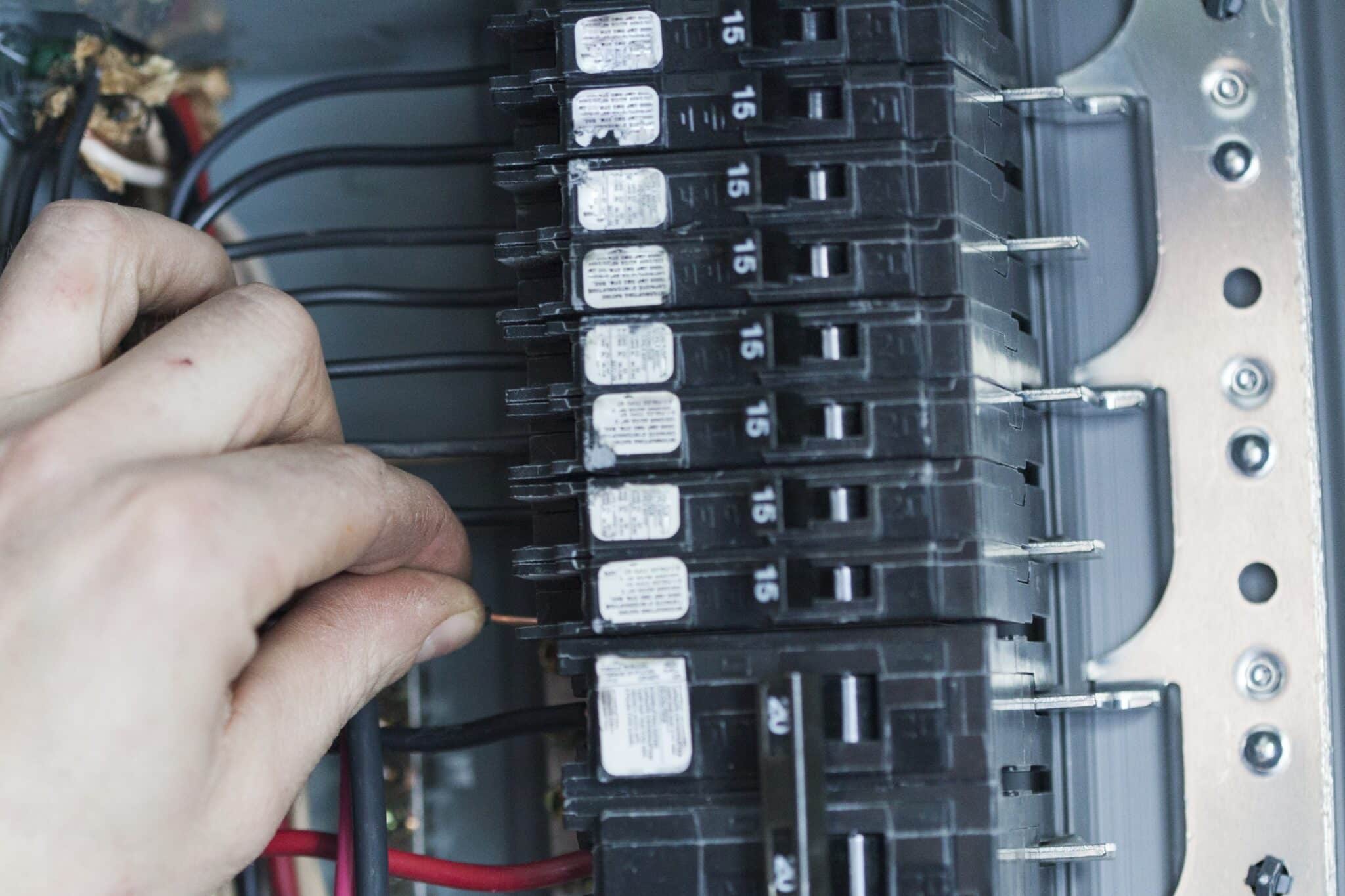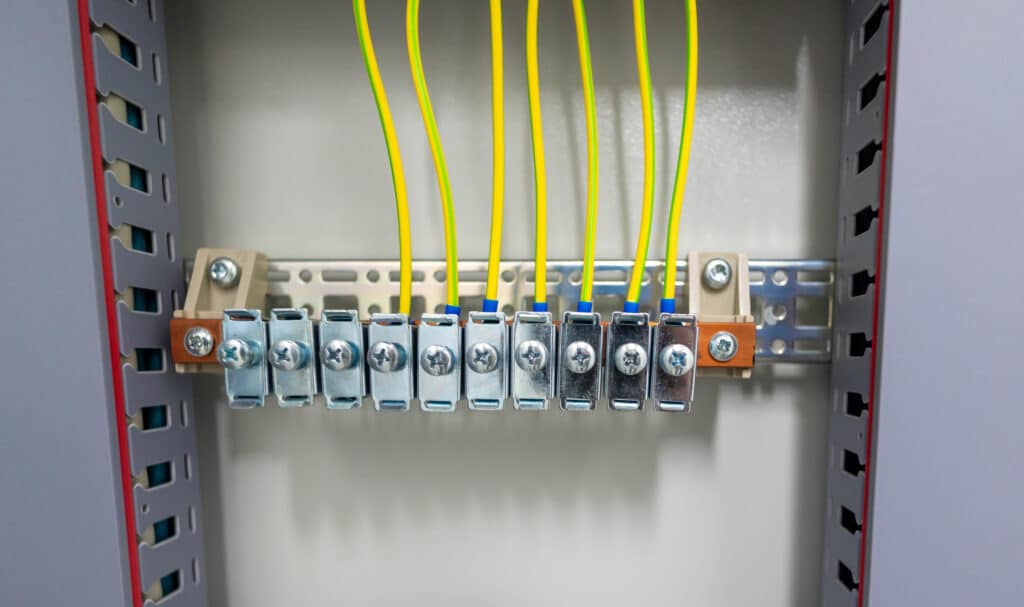Understanding the significance of electrical grounding in your home is crucial for ensuring the safety of your family and property. This process, often overlooked, plays a pivotal role in protecting your home in Wilmington, DE, from electrical hazards that can lead to fires or shock. By creating a safe path for excess electricity to travel to the ground, electrical grounding effectively minimizes the risk of these dangers. It’s not just about safety, it also enhances the performance of your electrical system.
Electrical grounding involves connecting the electrical system of your home to the earth using a wire, offering a straightforward yet effective solution to potentially dangerous electrical surges. This method ensures that in the event of a lightning strike or power surge, the excess electricity has a direct path to dissipate safely into the ground. Residents in New Castle, DE, and surrounding areas can significantly benefit from this added layer of protection, especially considering the unpredictable weather patterns that can lead to sudden electrical surges.
Moreover, the peace of mind that comes with knowing your home is safeguarded against electrical hazards cannot be overstated. Electrical grounding not only protects your appliances from damage but also keeps your family safe from the risk of electrical shock. It’s a fundamental aspect of any electrical system, acting as the first line of defense against the unpredictable nature of electricity.
In conclusion, the importance of electrical grounding in maintaining a safe and efficient home cannot be emphasized enough. Whether you’re in Wilmington, DE, New Castle, DE, or any other area, ensuring your home is properly grounded is a smart, preventative measure against electrical hazards. It’s an investment in your home’s safety and your family’s well-being, offering protection that is both necessary and invaluable.
Understanding Electrical Grounding and Its Purpose
Understanding electrical grounding and its purpose is essential for homeowners who want to ensure their property is as safe as possible. This system acts as a safeguard, channeling unwanted electrical currents away from your home and into the earth. In Wilmington, DE, where electrical systems in homes can be complex, grounding provides a necessary layer of protection. It prevents electrical overloads, which are a common cause of household fires.
Electrical grounding also plays a crucial role in the overall functionality of your home’s electrical system. It stabilizes the voltage levels, ensuring that appliances and electronics operate smoothly. For residents in New Castle, DE, this means your devices are less likely to suffer from electrical damage. This process, therefore, not only protects your home but also extends the lifespan of your appliances.
Moreover, grounding is vital for personal safety. It significantly reduces the risk of electric shock, a danger that can lead to serious injury or even death. By providing a path of least resistance for electrical current to follow, it ensures that any stray currents do not pass through a person. This feature is particularly important in homes with small children or elderly individuals, where safety is a paramount concern.
In conclusion, the benefits of electrical grounding extend beyond simple protection against power surges. It enhances the performance and longevity of electrical appliances, ensures the stability of your home’s electrical system, and, most importantly, keeps your family safe from electrical hazards. For homeowners in Wilmington, DE, and surrounding areas, investing in proper electrical grounding is a wise decision that offers peace of mind and significant safety advantages.
The Science Behind Electrical Grounding
Delving into the science behind electrical grounding reveals its critical role in home safety. This process relies on the earth’s ability to absorb excess electricity. By connecting the electrical system of a home directly to the ground, electrical grounding ensures that any overcurrent flows into the earth instead of causing harm. This is why homes in Wilmington, DE, are safer with a properly installed grounding system.
The principle of electrical grounding is based on conductivity. Metals, used in grounding systems, are excellent conductors, allowing electricity to pass through them easily. When a surge occurs, the grounding wire provides the least resistance path for the electrical current to reach the earth. This prevents the electricity from seeking alternative paths that could lead to electrical shocks or fires.
In New Castle, DE, and other areas, the soil composition can affect the efficiency of electrical grounding. Different types of soil have varying levels of conductivity. Installers take this into account to ensure that the grounding system is as effective as possible. This attention to detail is crucial for the grounding system to function correctly, safeguarding the home and its occupants.
Understanding the science behind electrical grounding emphasizes its importance. It is not just a technical requirement but a fundamental safety feature. Every home benefits from this system, protecting appliances, preserving system integrity, and most importantly, keeping residents safe from electrical hazards. This knowledge reinforces the value of ensuring your home is properly grounded.

Benefits of Electrical Grounding for Home Safety
Electrical grounding brings numerous benefits to homes, ensuring safety and operational efficiency. In Wilmington, DE, where electrical systems can be complex, grounding acts as a critical safeguard. It effectively prevents potential electrical fires by providing a safe path for excess electricity to dissipate. This makes it an indispensable part of home safety, protecting both property and lives.
For appliances and electronics, electrical grounding extends their lifespan. It does so by stabilizing voltage levels, which helps in preventing damage from power surges. Residents in New Castle, DE, can enjoy peace of mind knowing their investments are protected. This aspect of grounding is particularly beneficial, as it ensures the smooth operation of household appliances and electronics.
Moreover, electrical grounding reduces the risk of electric shock. By offering a path of least resistance, it ensures that stray currents do not pass through individuals. This feature is crucial in homes with vulnerable individuals, such as children or the elderly. It adds an extra layer of safety, making it a vital component of any home’s electrical system.
Lastly, the overall integrity of a home’s electrical system is maintained through effective grounding. It allows for the safe use of electricity, ensuring that homes in Wilmington, DE, and surrounding areas are protected from various electrical hazards. Grounding is not just a technical necessity, it is a fundamental aspect of ensuring a safe and comfortable living environment.
How Electrical Grounding Protects Your Appliances
Understanding how electrical grounding functions to protect your appliances is essential for homeowners. When a power surge occurs, electrical grounding acts as a safety net, directing the excess electricity away from your devices and into the ground. This process significantly reduces the risk of damage to your appliances, ensuring they continue to operate efficiently. In Wilmington, DE, where electrical systems can often be complex, this protection is invaluable for maintaining the longevity of your home electronics.
Electrical grounding also plays a pivotal role in enhancing the performance of your appliances. By stabilizing the electrical current, it ensures that appliances receive a consistent power supply, preventing the fluctuations that can cause wear and tear over time. Residents in New Castle, DE, will find their appliances not only last longer but also perform better, thanks to the effective management of electrical currents provided by grounding.
Moreover, the safety benefits of electrical grounding extend beyond the protection of appliances. It also safeguards individuals from the potential risk of electric shock that can occur during a power surge. By providing a direct path to the ground for excess electricity, it significantly reduces the likelihood of electrical accidents in the home. This feature is especially important in households with young children or elderly members, enhancing the overall safety of the living environment.
Finally, investing in a proper electrical grounding system is a proactive measure that homeowners can take to protect their investments. Not only does it preserve the integrity and functionality of appliances, but it also contributes to the safety and efficiency of the home’s electrical system as a whole. For those living in areas prone to electrical surges, such as Wilmington, DE, and New Castle, DE, electrical grounding is not just a recommendation, it’s a necessity for safeguarding your home and family.
Signs Your Home Needs Better Electrical Grounding
Recognizing when your home might need better electrical grounding is vital for maintaining safety and efficiency. If you notice frequent electrical surges, it’s a clear sign that the grounding system may not be adequately protecting your home. These surges can harm appliances and electronics, leading to costly repairs or replacements. Homeowners in Wilmington, DE, should be particularly vigilant, as local weather conditions can exacerbate these issues.
Another indicator is if you experience shocks from appliances or can feel a tingle when touching metal objects. This unsettling sensation suggests that electrical currents are not being properly directed into the ground. It’s a serious safety concern that requires immediate attention to prevent potential injuries. Residents in New Castle, DE, facing such issues should consult a professional to assess their home’s grounding system.
Flickering lights can also hint at insufficient electrical grounding. While often overlooked as a minor annoyance, this can signify deeper electrical problems. It indicates that your home’s electrical system is struggling to handle current flows, a situation that grounding improvements can mitigate. Addressing this early can save you from more significant electrical troubles down the line.
Lastly, if your circuit breaker trips frequently, it’s a signal that your home’s electrical load is not being managed correctly. This often occurs when the grounding system fails to provide a safe path for excess electricity. Upgrading the electrical grounding can help prevent these disruptions, ensuring a safer and more reliable electrical system for your home.
Electrical Grounding and Building Codes
Understanding the relationship between electrical grounding and building codes is essential for homeowners. These regulations ensure that electrical installations, including grounding systems, meet safety standards. In Wilmington, DE, adhering to these codes not only guarantees your home’s safety but also its compliance with local laws. This compliance is crucial for avoiding fines and ensuring your electrical system is up to date.
Building codes often update to incorporate new safety technologies and practices, including advancements in electrical grounding. These updates can significantly impact how grounding is implemented in new constructions and renovations. For residents in New Castle, DE, staying informed about these changes is vital. It ensures that any electrical work, especially grounding, aligns with the latest safety protocols.
Professional electricians play a key role in navigating these building codes. They possess the expertise to ensure your home’s electrical grounding system meets the required standards. By hiring a professional, you safeguard your home against electrical hazards and code violations. This is especially important in areas prone to electrical surges, where proper grounding is essential for safety.
Lastly, understanding the specific requirements of electrical grounding within building codes can save homeowners time and money. It prevents the need for costly corrections to non-compliant electrical systems. Ensuring your home’s grounding system is built according to these codes from the start is a wise investment. It offers peace of mind, knowing your home is both safe and compliant with local regulations.

Step-by-Step Guide to Checking Your Home’s Grounding System
Ensuring your home’s electrical grounding is functioning correctly is a proactive step towards safety. Start by locating your electrical panel in Wilmington, DE. This is often found in a basement or garage. Inside, you should see a grounding wire connected to your electrical system, typically a bare copper wire.
Next, inspect the physical condition of the grounding wire. It should be free from corrosion and securely attached at both ends. In New Castle, DE, environmental factors can affect the wire’s condition, so regular checks are advisable. If the wire shows signs of wear or damage, it’s time to contact a professional.
Testing the grounding system’s effectiveness is also crucial. You can use a multimeter, a tool that measures electrical voltage, resistance, and current. By placing one probe on the ground wire and another on a grounded object, you can check for continuity. A continuous circuit indicates a properly functioning grounding system.
Finally, if you’re unsure about any step or the results from your tests, it’s best to seek professional help. An electrician can provide a comprehensive evaluation of your home’s electrical grounding. They ensure everything is up to code and functioning safely, giving you peace of mind about your home’s electrical safety.
Choosing a Professional for Your Electrical Grounding Needs
When you decide to enhance your home’s electrical grounding, choosing the right professional is crucial. In Wilmington, DE, experienced electricians understand the local soil conditions and how they impact grounding effectiveness. They can assess your current system and make necessary upgrades or installations. Their expertise ensures your grounding system is optimized for safety and compliance with local codes.
In New Castle, DE, a professional electrician will also help navigate the complexities of building codes related to electrical grounding. They stay updated on the latest regulations, ensuring your grounding system meets all legal requirements. This not only protects your home from electrical hazards but also avoids potential fines for non-compliance. Their knowledge is invaluable for keeping your home safe and up to code.
Selecting a professional with a strong track record in electrical grounding projects is important. Look for electricians who have successfully completed grounding installations in your area. They should be willing to provide references or examples of their work. This gives you confidence in their ability to handle your project with the utmost care and professionalism.
Finally, ensure the electrician you choose offers a comprehensive service that includes inspection, installation, and maintenance. A thorough inspection identifies any current issues, while regular maintenance helps prevent future problems. By investing in a professional service, you safeguard your home against electrical risks, ensuring a safer environment for your family.
Frequently Asked Questions
What is electrical grounding?
Electrical grounding is a safety feature that directs unwanted electricity away from your home. It acts as a safe path, sending excess electricity into the ground. This process helps protect your appliances and reduces the risk of electrical shocks. By installing a grounding system, you ensure a safer environment for your family and your electronics.
How does electrical grounding work?
Electrical grounding uses a wire to create a safe path for electricity to follow. This wire connects your home’s electrical system to the earth. If too much electricity builds up, the grounding wire directs it away from your home. This keeps everyone safe from electrical shocks and protects your appliances.
Why is electrical grounding important?
Electrical grounding is crucial for keeping your home safe. It protects against electrical overloads by directing excess electricity into the ground. This process reduces the risk of fires and electrical shocks, safeguarding your family and appliances. By ensuring a safer living environment, electrical grounding is an essential part of any home’s electrical system.
Can I install electrical grounding myself?
Installing electrical grounding is a complex task that requires specialized knowledge and skills. It’s best left to professionals who understand the intricacies of your home’s electrical system. Attempting it without the proper training could lead to dangerous mistakes. Trusting an expert ensures your home’s safety and compliance with local codes.
What are the signs of poor grounding?
Signs of poor grounding include frequent electrical shocks, flickering lights, and appliances that fail prematurely. You might also notice a burning smell near outlets or devices. These symptoms suggest electricity isn’t flowing correctly in your home. To ensure safety, consider having a professional assess your electrical system.










